Administration Spotlight: Jen Visconti
Whether you engaged in or attended the much anticipated events on this years Evans Days celebration, needed an appointment with our Chairman during her time as his assistant, needed an Appointment or Promotion pushed through, or just needed a general question answered, you know who Jen Visconti is.
However, what you don't know is what makes our Senior Project Manager tick and what she's been up to lately.
If you attended or engaged in any of the events in last weeks Evans Days celebration, you got a sense of just some of the things she's been up to lately. While you were looking at/listening to some of the fantastic research poster sessions or listening to one of the lectures from either of our esteemed guest speakers, Jen had been working tirelessly and what seemed effortlessly to ensure everything stayed on track to make certain our two day celebration event went on without a hitch (with the help of the rest of her Evans Days team of course).
I "sat down" with my friend/colleague and asked her some questions that would give us a better idea of who she is on a personal level.
Q: How long have you worked in the Department of Medicine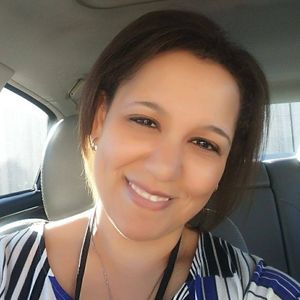
A: Almost 5 years!
Q: What was your favorite thing to do pre-COVID and what is it now post-COVID?
A: My favorite thing to do pre-COVID was to meet friends for dinner and drinks or host them for dinner parties at my apartment in the South End. Since that's no longer an option post-COVID, I am enjoying A LOT of eBooks from the Boston Public Library
Q: Have you discovered any NEW hobbies or have you discovered anything new about yourself since quarantine started back in March?
A: I've learned how to keep plants alive! I used to kill even the most basic succulents and I am proud to say I am an accomplished plant-mom now and all my plants are thriving!
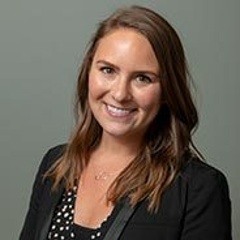
Q: What is your favorite movie/show you've seen in the last 6 months?
A: I've been binging Veronica Mars and I am ALL IN!
Q: What's one thing no one knows about you?
A: I used to bartend evenings after work and I don't remember how to make any of the cocktails anymore but I can still pour a healthy glass of wine!
Thank you Jen for answering my questions. I would also just like to point out that she just recently got engaged to her long-time "husband to be" Liam. Join me in congratulating her!
Appointments & Promotions – Oct ’20
Emeritus:
Kevan Hartshorn, MD
Assistant Professor(s):
Joseph Boyle, MD
Emily Hurstak, MD
Instructor(s):
Lisa Kim, CNP
Alison Nelson, DO
Betty Sam, RN
Appointments & Promotions – Sept ’20
Clinical Associate Professor(s):
Zoran Nedeljkovic, MD
Assistant Professor(s):
Charlotte Andersson, MD, PhD
Archana Asundi, MD
Samuel Belok, MD
Mara Horwitz, MD
Darae Ko, MD
Ana Warner, MD, MBA
Instructor:
Sumit Pathy, MD, MPH
Karla Talledo Thais, MD
New DOM Promotional Video Released!
A new video explaining just some of the reasons why we are all proud to practice, discover, and learn at Boston Medical Center was recently released.
Appointments & Promotions – July & August ’20
Emeritus:
Elihu Schimmel, MD
Professor(s):
Tamar Barlam, MD
Clinical Associate Professor(s):
David Tuck, MD
Assistant Professor(s):
Monica Ahluwalia, MD
Andrew Berical, MD
Ruben Dries, PhD
Kari Gillmeyer, MD
Elliott Hagedorn, PhD
Darae Ko, MD, MSc
Swetha Ramachandran, MD
Research Assistant Professor(s):
Saravanan Subramaniam, PhD
Instructor(s):
Alyssa Peterkin, MD
Erica Saunders, MD
Lorely Torres, NP
Tram Tran, NP
WordPress Training in September & October
WordPress Training Levels 1 & 2 have been announced for September and October.
WordPress: Level 1 (Introduction)
Learn the basics of WordPress in this introductory course, and the specifics of BU's WordPress installation. You will learn how to log into WordPress and navigate the editing and site-management tools, including adding images and links. You'll work with custom plugins such as the Restrict Access tools and Add A Link. You will learn how to get a site at BU for your department or yourself.
Sections
Online (Charles River Campus) room , .
Online (Charles River Campus) room , .
Online (Med Campus) room , .
Online (Charles River Campus) room , .
Register
WordPress: Level 2
This course assumes some basic experience with WordPress, such as IS&T's WordPress Introduction training.
This course introduces higher-level features of WordPress, including several custom plugins unique to BU. Topics covered include collecting data with forms; faculty profiles; section editing for granular control over who can edit what content; and visual and layout design options including slideshows.
Sections
Online (Med Campus) room , .
Online (Charles River Campus) room , .
Online (Charles River Campus) room , .
Online (Med Campus) room , .
Online (Charles River Campus) room , .
Register
Administration SpotLight: Takiesha Brooks
"Takiesha is a highly valued member of our department. She has served as Administrative Coordinator for Nephrology, Coordinator of the Nephrology fellowship program and as Executive Assistant to the Vice-Chair for Research in the Department of Medicine. In all her roles, her diligence, spirit of cooperation and upbeat personality have enabled her to interact effectively with and gain the respect and confidence of colleagues at all levels, including fellows and faculty, as well as administrative, managerial, custodial and maintenance staff. If something needs to be done, Takiesha will figure out a way to get it done.
Job Title:
Executive Assistant to Vice Chair of Research, Active Nephrology Fellowship Coordinator
Location:
650 Albany Street, 8th Floor
How many years have you been at BUSM/BMC?
4 years
What do you do in the Department of Medicine?
Support Dr. David Salant who is the Vice Chair of Research, coordinate meetings, seminars, and host events like Evans Research Days, Dim Sum which celebrates diversity. Support the Nephrology section as their Fellowship Coordinator by scheduling interviews, helping with onboarding and application for medical licenses for the Fellows. I also work as the EBRC Building Coordinator by assisting Facilities and coordinating the work being done in the EBRC building.
What do you like best about your job?
Being able to support such talented providers, researchers and colleagues to provide exceptional care to our patients.
Favorite thing to do outside of work?
Spend time with my 5 year old son and my family.
Little known fact:
I briefly worked at the State House with Representative Ms. Gloria Fox and was able to view their decision to legalize same sex marriages in Massachusetts. I have been in the health care field since 2002 at Children's Hospital then Beth Israel Deaconess Medical Center in 2006.
DOM Spotlight: Diversity, Equity, Inclusion and Belonging
In light of the recent events of the Black Lives Movement and most recently BU's Day of Collective Engagement, the Department of Medicine has made great efforts into improving their way of thinking when it comes to Diversity, Equity, Inclusion and Belonging.
I "sat down" with Dr. Angelique Harris, Director of Faculty Development and Diversity and asked her some questions about her team which includes Dr. Emelia Benjamin (Vice Chair, Faculty Development and Diversity) and Dr. Sheila Chapman (Associate Chair, Post Graduate URM Development, Faculty Development and Diversity).
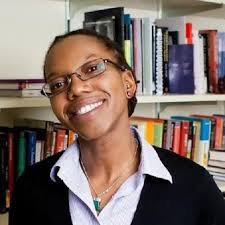
Q: What goals do the Diversity, Equity, Inclusion and Belonging team hoping to achieve?
A: Our goals are to develop programs, initiatives, and processes to fundamentally shift the culture with the Department of Medicine, thus making the pursuit of diversity, equity, inclusion, and belonging at the forefront of the DOM’s research, teaching, clinical, and administrative work and interactions.
Q: Has the Black Lives Matter movement changed your current thinking about diversity, equity, inclusion and belonging? If so, how?

A: I have worked in DEIB work for my entire career, and in terms of my research, I study marginalization. So this movement has not really changed how I think about DEIB at all. It has, however, certainly changed my approach and ability to promote DEIB. The BLM has been around for several years now, it’s gaining increased attention as a result of the impact that COVID has had on Black communities and Floyd’s murder. This increased attention has encouraged/forced people to examine the impact that race and racism has had on their lives and seek out solutions to promote DEIB in their work and personal lives. As a result, I am certainly more optimistic about doing DEIB work than I have been in the past as I think people are really interested in meaningful, impactful, and sustainable change.
Q: Are there any recent activities/initiatives that you would like everyone to know about?
A: The top initiatives would include:
- Department Diversity and Land Acknowledgement Statements. These serve as reminders of our values as a department.
- A DoM Reads Initiative, where we will focus on books pertaining to DEIB. This year the book will be: So You Want to Talk About Race by Ijeoma Oluo
- We will be offering bias reduction and bystander intervention trainings.
Q: How can faculty and staff members get more engaged?
A: There are a number of things faculty and staff can do. They can work to better educate themselves about issues of race, racism, and really, discrimination and bias overall. In addition, and perhaps, more importantly, they can commit to actively working to create sustainable solutions to promoting DEIB in all aspects of their lives.
Wilkins Boardroom Renovations COMPLETE!
The Wilkins Boardroom got a fancy, beautiful, and much needed upgrade over the last few months that will improve some functionality and enhances the overall look of the conference room.
The new upgrades includes:
- New audio system
- New phone system for audio conferencing
- 6 new speakers located in the ceiling
- Handheld and shirt clip microphones
- New amplifier located in the new sleek black podium in the front of the room
- New hardwood flooring
- Fresh new wall paint
- New quartz countertop installed in the back of the room with a trash bin on one end and a recycle bin located on the other end (PLEASE DO NOT SIT ON THE TABLE)
- Coat hooks installed on the back wall
- New award wall to be installed at the front of the room at a later date
- Stainless steel kick plates installed on the inside of the doors
- New art will be put up at a later date
- Disinfectant wipes station located near the back door
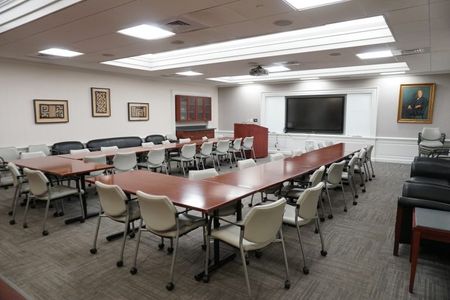
Before
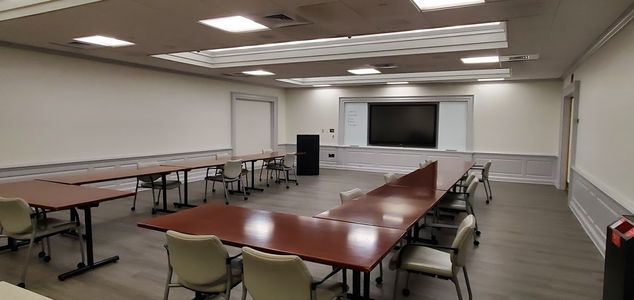
After: Front of Wilkins Boardroom
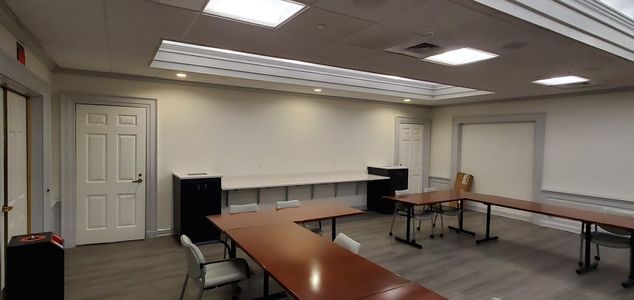
After: Back of Wilkins Boardroom
BUMC Toastmasters Virtual Open House
BUMC Toastmasters Virtual Open House
Overcome your fear of speaking in a friendly, supportive atmosphere!
Learn to: Organize your thoughts • Think on your feet • Develop meeting skills • Build confidence • Increase your vocabulary • Practice leadership skills • Speak with clarity and fluency • Provide and receive feedback
Thursday, September 17, 5:15 - 6:30 PM via Zoom
Learn more about BUMC Toastmasters: BUMCToastmasters.toastmastersclubs.org or email BUMCToasmasters@gmail.com
Toastmasters International is a worldwide nonprofit educational organization that empowers individuals to become more effective communicators and leaders. Headquartered in Englewood, CO, the organization’s membership exceeds 357,000 in more than 16,600 clubs in 143 countries. Since 1924, Toastmasters International has helped people from diverse backgrounds become more confident speakers, communicators and leaders. Visit us here for information about local Toastmasters clubs.